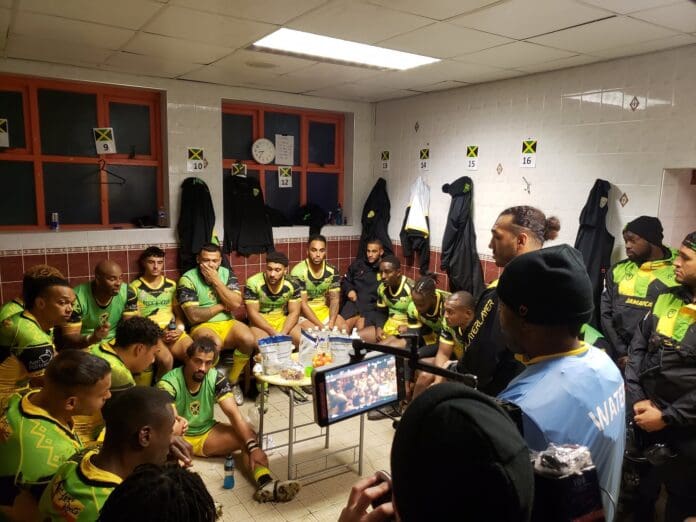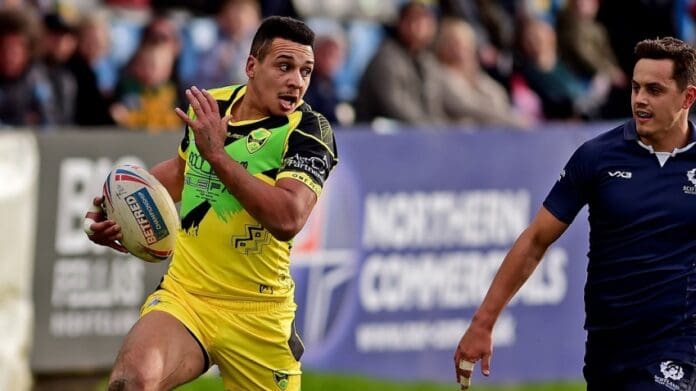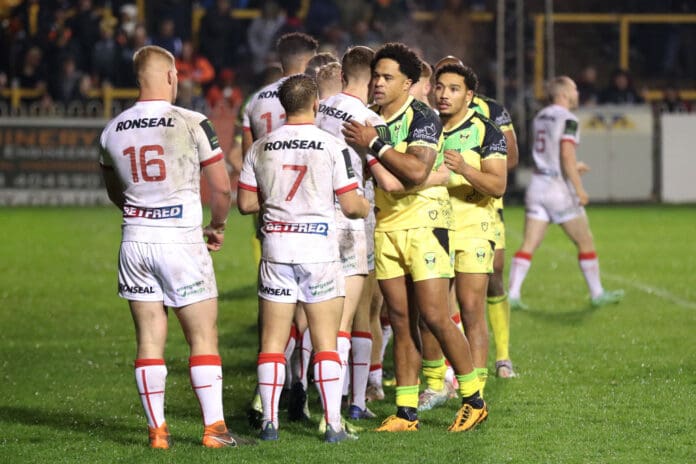
Jamaica. To the majority of us unworldly folk it’s a place famous for idyllic beaches, reggae music and some of the fastest humans on the face of the planet.
But now, thanks to the historic success of the Reggae Warriors, the Caribbean nation is about to make history as it embarks on its maiden Rugby League World Cup appearance.
It’s a historic moment for the nation and the team, the culmination of over a decade of hard work from passionate people, overcoming regular challenges and adversity on their incredible journey which began in earnest over a decade ago.
The journey so far
“Our first international game was against the USA in 2009,” head coach Romeo Monteith tells ZeroTackle.
“We’ve actually had two failed attempts at RLWC qualification, in 2011 (for the 2013 tournament) and 2015 (for the 2017 tournament).
“It’s been a rewarding journey, literally watching a dream take shape and materialise into reality.”


Monteith, who was part of the nation’s founding board in 2004, is celebrating his 10th year as head coach after coming on board as an assistant in 2008.
Throughout that time Jamaica’s qualification path had placed them in the ‘Atlantic Group’, regularly pitting them against the USA, Canada and even South Africa in previous versions.
Though wins in those early days were hard to come by as the team developed both its roster and identity, the 2018 Americas Championships proved the culmination of all their hard work, with the Reggae Warriors finally beating all comers to secure their World Cup debut.
The state of the game
Despite the team’s recent success, rugby league is still struggling for exposure in the region and on the island as a developing sport, competing with other codes for attention – though it’s slowly gaining traction in the school system.
While the local game wasn’t helped by a two-season lay-off due to the impacts of COVID, the competition has resumed in earnest in 2022.
“(At the moment) it’s a niche sport played in the urban areas of (capital city) Kingston and St Catherine,” Monteith says.
“There’s also a rural outpost in St Elizabeth. We currently average 800-1000 players from under-14s right through to open age.
“The game is played in a few colleges, a dozen high schools and there are also 8-16 community teams at various points.”
Though the league has secured some government support, there’s currently little opportunity for promotion and exposure to the wider local population – something that will hopefully be helped by the World Cup appearance.
“It’s not widely supported by the government, but it is an officially-recognised sport and we receive a monthly grant of US$570 to administer the game,” he said.
“There’s no rugby league on free-to-air television, so it’s still not widely known.”
Jamaican teams regularly capture the imagination and sentimental support of neutral fans in international competitions, but Monteith explains that despite the Reggae Warriors’ recent success, sponsorship has proven difficult to come by at a domestic level – another area that will hopefully be aided by a solid showing at the tournament.
Outside of the funding that the local game receives from the government, many of the players and staff are still individually responsible for financially assisting the national team’s efforts.
“None of our domestic competitions are sponsored,” Monteith says.
“The corporate world tends to put their funds into major sports such as football and track and field, which has wide public appeal.
“Our national high school track and field championship sees 30,000 rabid fans packed into the national stadium. We’re pretty pumped if our grand final sees 300-500 spectators.
“Like many developing countries, players and coaches usually pay their way in full or part to represent their countries.”
It’s these kinds of struggles that demonstrate just how important this World Cup appearance is for the island nation.
When you consider that Jamaica doesn’t have a single dedicated rugby league field, it underlines the magnitude of their success in overcoming adversity. It’s hoped their arrival on the international stage will see more positive developments follow for the domestic competition.
While the side will contain a significant contingent of players who are currently plying their trade in the English Super League or Championship, the national team understands the importance of ensuring domestic players are part of the squad and are exposed to the highest levels of the game, especially given the challenging conditions they face back home.
“We’ve always had a mix of UK-heritage players and domestic-based players,” Monteith says.
“There are always some domestic players (in the national team) and there always will be. Our player pool has semi-pro and professional players from the UK and amateurs based on the island.
“Our domestic competitions still rent or borrow fields to play matches. The pitches are pretty hard as most are not irrigated. We’ll play anywhere from 2-6 matches in hot conditions.

CASTLEFORD, ENGLAND – OCTOBER 15: Jordan Turner of Jamaica shakes hands with the players of England Knights after the Rugby League International match between England Knights and Jamaica at Mend-A-Hose Jungle on October 15, 2021 in Castleford, England. (Photo by Lewis Storey/Getty Images)
“All the teams have basic amenities and resources. The gameplay is very basic for most teams, all the players are amateurs, so it’s more about having fun with your friends.
“After the game, everyone heads home. There’s no clubhouse, so the game is the highlight of their day.”
With qualification games regularly taking place in the United States, the Jamaican rugby league has taken a cost-effective approach to team selection – although it arguably made the qualification process more challenging given the team’s struggles with funding and the headaches created by the COVID pandemic.
“The make-up of the team for matches depends on the opposition and the funding we can raise,” Monteith explains.
“For example, a game against Wales in the UK would see the team made up of 15-17 UK-based players, while a game against the United States or Canada in North America will see 15-17 domestic players selected.”
Though that model can create a dislocation in the playing squad, it’s a testament to the squad that they’ve become competitive on both sides of the Atlantic, and the group still regularly interacts via social media and other means of communication.
Thankfully for the Reggae Warriors, this year’s World Cup is taking place in England, where a healthy percentage of the team’s best players are already based.
“The majority of our World Cup players are based in the UK so that helps, but players regularly keep in touch from both sides of the Atlantic,” Monteith says.
The detractors
As to be expected in a game so regularly dominated by traditional powerhouses, few have given the Reggae Warriors much of a chance of escaping a group that contains New Zealand, Lebanon and the Irish, especially after highly-rated winger Dom Young turned down his spot in national side to chase a role in the English squad.
That was a blow that the coach refused to be drawn on, but Monteith had previously shared his thoughts on the perceived slight of NRL360 pundits after they appeared to mock the aspiring nation’s inclusion in the tournament.
Instead of being offended, the optimistic coach could only see the benefits.
“Everything is irie,” Monteith said in the wake of the comments.
“The fact that two former NRL players on TV mention Jamaican rugby league, in whatever context and whatever their intentions, means a couple thousand more rugby league fans from Australia, NZ and the Pacific Islands know the Reggae Warriors are at the World Cup.
“At the end of the day, we’ve earned our place and exposed thousands of Jamaicans to the sport on the island and tapped into our expatriate family in the UK and other places.
“We aim to do our best with the limited resources we have.”
After over a decade of building and development, the hard work of many has paid off and Jamaica has officially arrived – but overcoming the mountain of challenges the national team has faced wouldn’t be possible without the sponsorship that management has been able to secure.
“I’d really like to say thanks to the UK-based companies who have partnered with our team and enable us to participate in the RLWC; our main sponsor Smilefast, Age Partnership, Twisted, Reggae Reggae Sauce, AB Foods, Player Layer, Stags, Clarks, Farah and MSC Nutrition.
“Literally, without these brands we could not participate. I don’t think most fans realise the tremendous costs small organisations like ours face to participate in these tournaments.”
When Jamaica make their historic World Cup debut in less than a week, there’ll likely be a moment that Monteith and his team reflect on the challenging, decade-long journey that has brought them to this point.
Hopefully, in another ten years, a well-established and respected national team and a strong and prosperous domestic league will be able to look back at this tournament as the start of a next chapter that brings success to another fledgling but passionate rugby league nation.
Jamaica opens their World Cup campaign against Ireland on Sunday October 16 in Leeds. Australian fans can catch the historic match at 3am on October 17 (AEDT).
Source:: ZeroTackle



